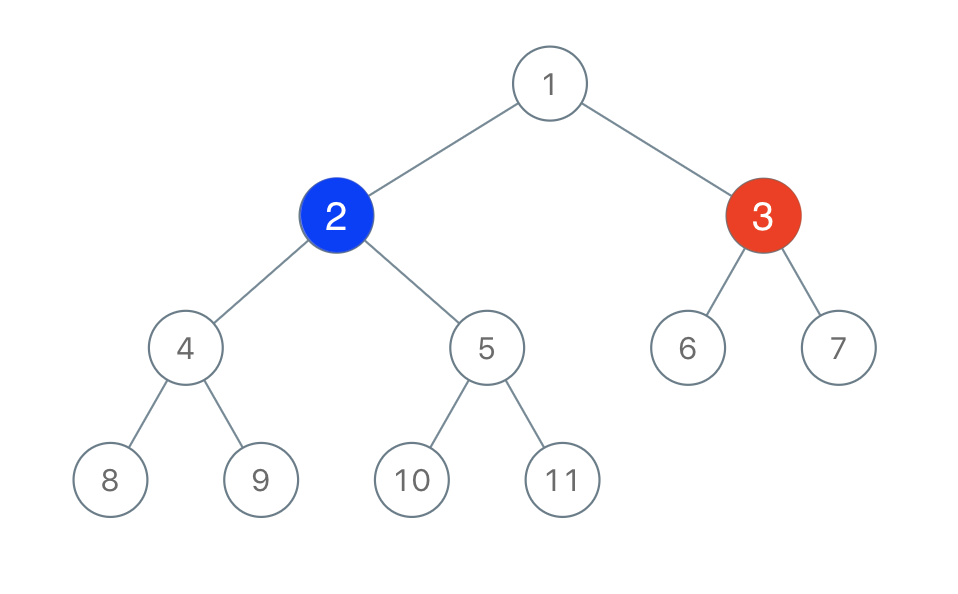1248. Binary Tree Coloring Game¶
Difficulty: Medium
LeetCode Problem View on GitHub
1248. Binary Tree Coloring Game
Medium
Two players play a turn based game on a binary tree. We are given the root of this binary tree, and the number of nodes n in the tree. n is odd, and each node has a distinct value from 1 to n.
Initially, the first player names a value x with 1 <= x <= n, and the second player names a value y with 1 <= y <= n and y != x. The first player colors the node with value x red, and the second player colors the node with value y blue.
Then, the players take turns starting with the first player. In each turn, that player chooses a node of their color (red if player 1, blue if player 2) and colors an uncolored neighbor of the chosen node (either the left child, right child, or parent of the chosen node.)
If (and only if) a player cannot choose such a node in this way, they must pass their turn. If both players pass their turn, the game ends, and the winner is the player that colored more nodes.
You are the second player. If it is possible to choose such a y to ensure you win the game, return true. If it is not possible, return false.
Example 1:

Input: root = [1,2,3,4,5,6,7,8,9,10,11], n = 11, x = 3 Output: true Explanation: The second player can choose the node with value 2.
Example 2:
Input: root = [1,2,3], n = 3, x = 1 Output: false
Constraints:
- The number of nodes in the tree is
n. 1 <= x <= n <= 100nis odd.- 1 <= Node.val <= n
- All the values of the tree are unique.
Solution¶
/**
Definition for a binary tree node.
public class TreeNode {
int val;
TreeNode left;
TreeNode right;
TreeNode() {}
TreeNode(int val) { this.val = val; }
TreeNode(int val, TreeNode left, TreeNode right) {
this.val = val;
this.left = left;
this.right = right;
}
}
*/
class Solution {
private ArrayList<ArrayList<Integer >> adj;
private int id;
private HashMap<TreeNode, Integer> getId;
private HashMap<Integer, TreeNode> getNode;
private int dp[][];
private int depth[];
private int subtree[];
private int xthNode;
public boolean btreeGameWinningMove(TreeNode root, int n, int x1) {
adj = new ArrayList<>();
getId = new HashMap<>();
getNode = new HashMap<>();
subtree = new int[n + 1];
for (int i = 0; i <= n + 10; i++)
adj.add(new ArrayList<>());
xthNode = -1;
id = 1;
BuildGraph(root, x1);
dp = new int[n + 1][19];
depth = new int[n + 1];
dfs(1, 0);
int x = xthNode;
for (int i = 1; i <= n; i++) {
//what will happen i choose this node as second player start point;
if (i != x) {
int lca = lca(i, x);
if (lca == x || lca == i) {
int total = n;
int firstPlayer = 0, secondPlayer = 0;
if (depth[x] < depth[i]) {
//how many times can i jump upwards;
int times = (depth[i] - depth[x]) / 2;
int newI = findKthParent(i, times);
secondPlayer += subtree[newI];
firstPlayer += n - secondPlayer;
if (secondPlayer > firstPlayer) {
return true;
}
}
else {
int times = (depth[x] - depth[i]) / 2;
int newX = findKthParent(x, times);
firstPlayer += subtree[newX];
secondPlayer += n - firstPlayer;
if (secondPlayer > firstPlayer)
return true;
}
}
else {
//they don't lie in same subtree;
int dist = depth[x] + depth[i] - 2 * depth[lca];
int firstPlayer = 0, secondPlayer = 0;
if (depth[x] > depth[i]) {
int totalNode = dist - 1;
int times = totalNode / 2;
if (totalNode % 2 != 0) times++;
int newX = findKthParent(x, times);
firstPlayer += subtree[newX];
secondPlayer += n - firstPlayer;
if (secondPlayer > firstPlayer)
return true;
}
else if (depth[i] < depth[x]) {
int totalNode = dist - 1;
int times = totalNode / 2;
int newI = findKthParent(i, times);
secondPlayer += subtree[newI];
firstPlayer += n - secondPlayer;
if (secondPlayer > firstPlayer)
return true;
}
else {
//what if both of them have same depth;
int times = (dist - 1) / 2;
int newI = findKthParent(i, times);
secondPlayer += subtree[newI];
firstPlayer += n - secondPlayer;
if (secondPlayer > firstPlayer)
return true;
}
}
}
}
return false;
}
private void BuildGraph(TreeNode root, int x) {
Queue<TreeNode> q = new LinkedList<>();
q.offer(root);
while (q.size() > 0) {
int len = q.size();
for (int i = 0; i < len; i++) {
if (!getId.containsKey(q.peek())) {
getId.put(q.peek(), id);
getNode.put(id, q.peek());
id++;
}
if (q.peek().left != null) {
q.offer(q.peek().left);
getId.put(q.peek().left, id);
getNode.put(id, q.peek().left);
id++;
int u = getId.get(q.peek()), v = getId.get(q.peek().left);
adj.get(u).add(v);
adj.get(v).add(u);
}
if (q.peek().right != null) {
q.offer(q.peek().right);
getId.put(q.peek().right, id);
getNode.put(id, q.peek().right);
id++;
int u = getId.get(q.peek()), v = getId.get(q.peek().right);
adj.get(u).add(v);
adj.get(v).add(u);
}
if (q.peek().val == x) {
if (xthNode == -1)
xthNode = getId.get(q.peek());
}
q.poll();
}
}
}
private int lca(int u, int v) {
if (depth[u] > depth[v]) {
int temp = u;
u = v;
v = temp;
}
int diff = depth[v] - depth[u];
v = findKthParent(v, diff);
if (u == v)
return u;
for (int i = 18; i >= 0; i--) {
if (dp[u][i] != dp[v][i]) {
u = dp[u][i];
v = dp[v][i];
}
}
return dp[u][0];
}
private int findKthParent(int u, int k) {
int count = 0;
while (k > 0) {
if (k % 2 == 1)
u = dp[u][count];
count++;
k >>= 1;
}
return u;
}
private void dfs(int u, int par) {
subtree[u] = 1;
dp[u][0] = par;
for (int i = 1; i < 19; i++)
dp[u][i] = dp[dp[u][i - 1]][i - 1];
for (int v : adj.get(u)) {
if (v != par) {
depth[v] = 1 + depth[u];
dfs(v, u);
subtree[u] += subtree[v];
}
}
}
}
Complexity Analysis¶
- Time Complexity:
O(?) - Space Complexity:
O(?)
Approach¶
Detailed explanation of the approach will be added here